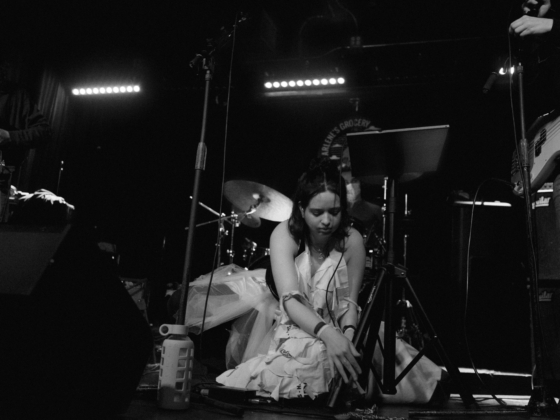I've never totally understood the idea of "score" in video games. Granted, now I mostly play more abstract stuff, and when I was little getting a high score was largely just an opportunity for the young me to write "TURD_PRINCE92" on a computer screen for the world to see. However, there's no denying that watching a little number in the corner of your screen rapidly increase is a huge motivating factor for a lot of people. I'm kind of apathetic about getting a high score in things that don't really affect the actual operant parameters of my life – things like video games or pickup basketball. However, while checking up on my Bandcamp, Soundcloud, Facebook, and Last.fm the other day, it occurred to me that I'm probably just as big of a score nerd as even the most stereotypical arcade goon. I'm just playing a different game.
Nattymari, the resident witchbwoy anthropologist of the Mishka Bloglin, calls that game "RPG Funk." As I argued in last week's article, the contemporary music scene owes a greater debt to computerization and the Internet than it does to physical forms of innovation, distribution, an consumption. Consequently, as Natty argues, the patterns of the "Internet music scene" more closely resemble the relational constructs associated with computer mediation than they do traditional entertainment structures. Specifically, the scene resembles a giant MMORPG.
The term "gamification" has become something of a buzzword among the business community lately. Basically, business-marketing major types realized that game systems could be applied to product marketing in order to increase the level of engagement with a customer. Whether or not you consider "gaming addiction" to be legitimate, it's at least clear that games are engaging enough on the whole that people like them and want to keep coming back enough for the term "poopsocking" to exist. Wanting to tap in to the addictive qualities of gaming, marketers started to gamify their systems of consumption by providing the same kind of empty positive feedback one might receive from a game, in the form of scores and achievements, to their product.
So, I might receive a "Pizza Bloodlord" badge for my account on Pizza Company's website for accomplishing the notable feat of ordering one million pizzas. Or, maybe I'll get a free coupon for retweeting one of their advertisements. The idea is to turn consumption in to the means for a gamified reward of some kind – usually just empty positive reinforcement, but sometimes in the form of a tangible good or service. Most gamified consumption takes place on the web, as purchase- and action-tracking simplifies the process substantially.
Sound familiar? It should – the gamification strategy was perfected by social media, specifically back during the days of MySpace. The idea didn't really have a name back then, as marketers hadn't really grabbed hold of it yet, but the explanatory model is still there. Let's turn this in to a Buzzfeed nostalgia post for a few – remember the 2000's? Remember those people who you'd describe as "MySpace famous?" What did that mean? Well, it was kind of derogatory – people who were MySpace famous had a metric ton of friends added on their page, but they didn't really have much else to show for it other than this nebulous sort of abstract fame which didn't really translate to reality in any meaningful way. Web systems that quantify social interaction in to units work to encourage user investment in much the same way that a scoring system in a videogame does – by providing numerical positive reinforcement for a particular behavior, the system is able to encourage that behavior in participating individuals. This is why some people can become addicted to social media – it provides the same gamified positive reinforcement in exchange for participation. It's fun to see the little number on the side of the page, your friend count, your likes, your score, go up and up and up. It feels fulfilling and it feels good. But it doesn't just feel good on MySpace, it feels good on Soundcloud and Bandcamp too.
The web systems we use to distribute and consume music, having grown out of the same social media framework that began with MySpace (or Makeoutclub, if you ever had clavicle piercings and a tattoo of a nautical star), are vulnerable to the same distortions. It has become far too easy to become obsessed with the quantity of plays on your Soundcloud, downloads from your Bandcamp, likes on Facebook, while forgetting that these indicators are, at best, equivalent to the amount of friends added to a MySpace account – often solely reflective of savvy media manipulation rather than of legitimate success. This common misconception is reflected in the vast junkyard of media that is Internet musician-targeted writing. There are millions of articles, websites and e-books clamoring to teach aspiring musicians how to "improve their social media presence," "get more followers" and "boost your play count" on Soundcloud and it's associated platforms. Raising these numbers is treated as a panacea, the best way to increase a musician's shot at establishing the coveted "real career."
However, in reality this isn't really the case – as Nattymari pointed out, the so-called "Internet scene" is more of a bizarre game than it is an actual industry. Like an MMORPG (probably more toward the EVE Online end of the spectrum, rather than the theme park-y World of Warcraft side), the web scene is a pretty insular community. Everyone makes music, and everyone listens to one another's tracks. The best way to find out about websites like Soundcloud and Bandcamp is to already be a musician looking for a place to put your own work, so it's no wonder that most of the fans in the web scene at least dabble in the creation of music. Musicians, fans, and (GASP!) even bloggers fill the roles of the game's players, and are interdependent with one another in a way that legitimizes the continuing existence of each of these subgroups largely based on the plays that the blogs are able to generate for the musicians, and the hits that musicians are able to generate for the blogs. It's a closed, cyclical system that just kind of eats itself without actually expanding, without actually producing much that's tangible. The system certainly produces entertainment, just as video games do, and that entertainment is ultimately what we're here for. Nonetheless, it's important to understand the interactions and structures which conspire to produce that entertainment.
It's awesome that we live during an era in which anyone can get involved in the production of the creative works which resonate most deeply with them. However, with that in mind, it's even more important that we don't lose sight of the big picture when it comes to making music online. Any sort of fame that can be quantified in play counts and Facebook likes is, at best, the sort of light positive reinforcement which compels you to keep playing the game or, at worst, misleading and misdirected. Of course, these quantifiable, “scoreable” quotients of success will certainly come as a byproduct of a legitimately successful musical career, but the point I wish to impart is that these numerical scales are a side effect rather than the end goal themselves. So musicians, please don't worry about trying to get that high score. Worry about being the best musician that you can be. So that I can write about it and improve my own score.











